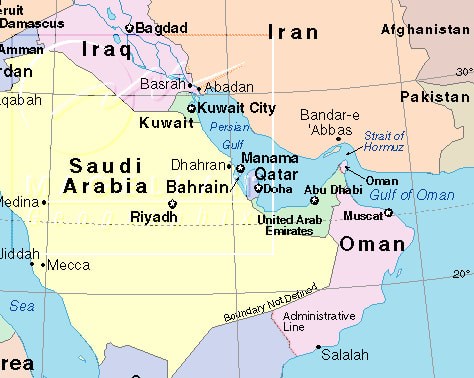The Gulf countries, also known as the Gulf Cooperation Council (GCC) states, encompass a region of strategic significance at the intersection of Asia, Europe, and Africa.
Comprising Bahrain, Oman, Kuwait, Saudi Arabia, the United Arab Emirates, and Qatar, these nations possess vast reserves of oil and natural gas, making them key players in the global economy and geopolitics.
The Gulf countries share several commonalities, including their geographical location along the Arabian Gulf, similar cultural backgrounds, and a shared commitment to preserving stability and security in the region.
Despite their similarities, each country has its unique economic and geopolitical characteristics, contributing to the collective strength and influence of the Gulf Cooperation Council. This article seeks to inquire into the major role of Gulf countries in the global economy, and their important impact on geopolitics.
Table of Contents
Major roles of gulf countries in the global economy
These are some of the main achievements of Gulf countrie recently:
1. Successful diversity in the region’s economy
The Gulf Cooperation Council (GCC) is riding a wave of expansion thanks to a long-term plan that is pushing the region’s economy into new fields. The future depicted by the regional development strategies and policy visions is one that is dynamic, productive, and innovative.
In order to achieve this goal, enormous expenditures have been made, and are continuing to be made, in areas like education, research, technology adoption, and innovative start-up entrepreneurship.
The region’s GDP is undergoing a radical transformation as a result of economic diversification, which is also fueling the expansion and improvement of exports. Logistics, banking, and tourism are just a few examples of the service exports that have seen significant growth, but other non-oil exports have also stretched value chains to open up new markets.
2. Effective post pandemic rebound
The regional authorities in the Gulf displayed efficient crisis management in detecting diseases, controlling risks, and rolling out vaccinations, and this is reflected in the region’s robust economy.
The professional handling of an increasing number of mega-events, such as Dubai Expo 2020, has contributed to a normalization of connectivity with the outside world. Because of this, the Gulf region has been able to increase its focus on developing strategically vital outward-looking activities like trade facilitation and tourism.
The Gulf states are well placed to play an essential part in the globe’s energy transformation. Solar energy investments have broken records on a regular basis, and energy efficiency is rising to prominence as a primary factor in economic growth. The export of sustainable energy is becoming feasible due to the growing integration of energy markets in the Gulf region and beyond. It would allow the countries in the region to play a similar strategic role in energy provision as they do in the oil and gas industry.
Read also: Why is Dubai a strategic guide for the growth of the entire Gulf region
3. Improving productivity capacity through investment
The future aspirations of the Gulf countries revolve around investment. It is a sensible strategy for making use of the region’s abundant wealth to boost output.
Foreign direct investment (FDI) is expanding again in recent years despite global economic concerns, and is expected to reach 44.4 billion dollars in the Gulf region by 2021 from 14.5 billion dollars in 2017.
In Q1-3 of 2022, Bahrain attracted a total of 921 million dollars in FDI. Furthermore, the Gulf’s capital markets have seen a significant uptick in activity, with a rise in the number of IPOs (Initial public offerings).
Major roles of gulf countries in global geopolitics
These are the main roles of gulf countries in global geopolitics:
1. Regional security and stability
The strategic positioning of the Gulf states aids in maintaining peace and safety in the region. They take part in attempts to improve regional security and keep good relations with major world powers.
These nations have made significant investments in their military might, hosting foreign bases and participating in joint military exercises. Their reliability is essential to the smooth distribution of global energy sources.
2. Mediation and diplomatic effort
Saudi Arabia, Qatar, and the United Arab Emirates (UAE) lead diplomatic efforts to foster peace and security in the region and beyond.
They play a crucial role in resolving disputes and establishing diplomatic ties by mediating regional crises and initiating peace initiatives.
3. Cultural and soft power influence
The Gulf states have spent a lot of money to expand their sphere of cultural and soft power influence. The United Arab Emirates (UAE) has become a center for entertainment and cultural events.
Qatar on the other hand has become a prominent player in the worldwide media sector thanks to Al Jazeera. These initiatives improve their standing on the global stage and increase their sway beyond their borders.
Enhancing global economy and geopolitics
One cannot overestimate the significance of the Gulf countries’ contributions to the global economy and geopolitical landscape. They have become economic superpowers thanks to their natural gas deposits and huge oil and their efforts to diversify their economies. Because of their central location and dedication to maintaining peace in the region, they play an important role in international affairs.
The influence of the Gulf states is projected to increase as they continue to adapt to the changing economic and geopolitical environments. However, they must also overcome obstacles like switching to renewable energy sources, reducing economic and social inequality, and adjusting to an ever-shifting international system.
The Gulf countries can make even more of an impact on the global economy and geopolitics by pooling their resources and working together to foster equitable growth at home.
Read also: What are OPEC countries and how powerful are they in the global oil market












